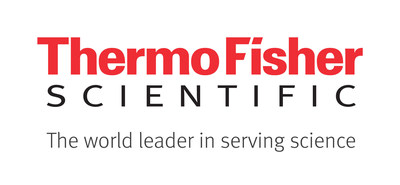
India Media Room
CARLSBAD, Calif., April 1, 2019 /PRNewswire/ -- As laboratories increasingly look to bring advanced molecular testing in-house, the results of a new retrospective clinical research study show that tumor mutation burden (TMB) assessments performed in a French hospital's clinical laboratory using the Oncomine Tumor Mutation Load Assay provides comparable results and predictive value to a commonly ordered, commercial next-generation sequencing (NGS) panel that is available only as an outsourced test.
The study, led by Dr. Paul Hofman, head of the laboratory of clinical and experimental pathology at Pasteur Hospital in Nice, France, found a high degree of correlation in the ability of the Oncomine assay to assess predictive response in non-small cell lung cancer (NSCLC) and melanoma patients. The study will be featured as a poster (abstract 4889) during the American Association for Cancer Research (AACR) 2019 Annual Meeting in Atlanta, March 29-April 3.
TMB has emerged as a focus of clinical trials aiming to harness genomic data to more effectively identify patients who may benefit from immune checkpoint inhibitor therapy. Because these trials primarily rely on outsourced testing, which can pose logistical and cost issues, the authors sought to compare outsourced results with data derived from in-house TMB assessment.
"Results can take up to 20 days or more when a patient's sample is sent out for TMB analysis," said Dr. Hofman. "With the Oncomine Tumor Mutation Load Assay, we were able to secure results in as little as seven days. This shortened turnaround time enables faster access to test results and placement for patients into applicable clinical studies."
The study assessed TMB status in randomly selected formalin-fixed paraffin-embedded (FFPE) samples from 51 NSCLC and 25 melanoma patients who were previously treated with checkpoint inhibitors. When results from samples assessed in-house were compared to outsourced sample results, correlation scores were high for both NSCLC (R2 = 0.88) and melanoma (R2 = 0.95). Prediction of a durable clinical response by receiver operating characteristic was comparable between Oncomine Tumor Mutation Load Assay (AUC = 0.70) and the outsourced test (AUC = 0.74). Additionally, analysis could not be performed in 22 percent and 8 percent of NSCLC and melanoma cases, respectively, due to stringent sample requirements of the outsourced test, according to the study.
"Among the problems with outsourcing samples are limited control over data analysis parameters, access to raw data and its ownership, and slow turnaround times," said Luca Quagliata, global head of medical affairs for clinical NGS and oncology, Thermo Fisher Scientific. "Slow turnaround time becomes even more problematic if the test cannot return results because higher quantities of sample are required or the material is degraded. This study clearly shows that in-house testing, combined with very low sample requirements of Oncomine gene panels, including the Tumor Mutation Load Assay, help overcome these obstacles."
Dr. Hofman will present his study (section 19, poster board 12, abstract 4889) from 8 a.m.-noon, April 3 at AACR. Thermo Fisher Scientific researchers will also present several posters highlighting their latest NGS-based research on applications ranging from microsatellite, immune repertoire and liquid biopsy analysis. Highlights include:
Monday, April 1, 2019
- Peripheral blood TCR-beta chain convergence in chronic viral infection and cancer: Emerging trends from novel immune repertoire biomarker. Section 18, poster board 16, abstract 1347. Presented by Tim Looney, Ph.D., clinical next generation sequencing and oncology, Thermo Fisher, from 8 a.m.-noon.
- Improvement of tumor mutation burden measurement by removal of deaminated bases in FFPE DNA. Section 33, poster board 22, abstract 1701. Presented by Janice Au-Wong, Ph.D., and Warren Tom, Ph.D., clinical next generation sequencing and oncology, Thermo Fisher, from 8 a.m.-noon.
Tuesday, April 2, 2019
- A targeted semi-conductor-based, NGS test to characterize microsatellite instability in FFPE tumor samples. Section 35, poster board 3, abstract 3492. Presented by Annie Kraltcheva, Ph.D., clinical next generation sequencing and oncology, Thermo Fisher, from 8 a.m.-noon.
Wednesday, April 3, 2019
- Characterization of genetic mutation spectra and identification of gene amplification and fusion variants in cell-free nucleic acid from cultured cancer cell media and liquid biopsy specimens using Oncomine Pan-Cancer Cell-Free Assay. Section 32, poster board 2, abstract 5123. Presented by Ru Cao, Ph.D., clinical next generation sequencing and oncology, Thermo Fisher, from 8 a.m.-noon.
For more information on Thermo Fisher's activities at AACR 2019, please visit the company's conference page here or visit its booth (#1924) during the conference.
About Thermo Fisher Scientific
Thermo Fisher Scientific Inc. is the world leader in serving science, with revenues of more than $24 billion and approximately 70,000 employees globally. Our mission is to enable our customers to make the world healthier, cleaner and safer. We help our customers accelerate life sciences research, solve complex analytical challenges, improve patient diagnostics, deliver medicines to market and increase laboratory productivity. Through our premier brands – Thermo Scientific, Applied Biosystems, Invitrogen, Fisher Scientific and Unity Lab Services – we offer an unmatched combination of innovative technologies, purchasing convenience and comprehensive support. For more information, please visit www.thermofisher.com.

Media Contacts | |
Mauricio Minotta | Jen Heady |
Director, Public Relations | Greenough Brand Storytellers |
+1 760 929 2456 | +1 617 275 6547 |
SOURCE Thermo Fisher Scientific

